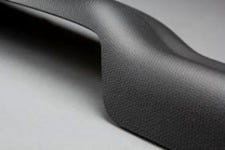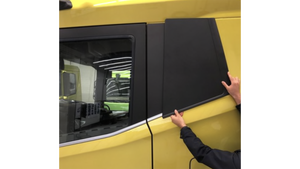Polycarbonate/acrylonitrile-butadiene-styrene (PC/ABS) compounds from Styron Automotive have reportedly have been instrumental in the development of mid console, glove box, and trunk trim components for the BMW i3 series. The material has also been used in Mercedes Benz C class pillars and door panels.
April 17, 2014
Polycarbonate/acrylonitrile-butadiene-styrene (PC/ABS) compounds from Styron Automotive have reportedly have been instrumental in the development of mid console, glove box, and trunk trim components for the BMW i3 series. The material has also been used in Mercedes Benz C class pillars and door panels.
Pulse GX50 PC/ABS grades are positioned as an economical mixture of PC and ABS in a blend ratio that provides a 4% decrease in density compared to industry-standard PC/ABS grades, as well as low carbon emissions (VOC) in the range of 10 ppm.
|
Unpainted PC/ABS parts slash overall cost equation. |
In addition, the series provides outstanding resistance to heat distortion at usage temperatures up to 110ºC, and high impact strength at temperatures as low as -30ºC. Pulse GX50 is also suitable for use in unpainted applications, thereby reportedly reducing part costs by 50% according to OEM and Tier partners. A unique stabilization package is utilized to enable use without painting.
Pulse GX50 has enabled the production of lighter and cheaper interior parts, while meeting the high safety and environmental standards. As an example, these parts create for BMW 4% less waste and are easier to recycle because they are unpainted.
For BMW in particular, the UV stabilizing technology played a key role in their decision to choose Pulse GX solutions. Until recently, BMW exclusively used painted PC/ABS parts for visible components designed in that material for its specific heat resistance and low temperature impact capabilities. However for their new models, they have adopted a new approach and have been investing in unpainted PC/ABS for uncovered/exposed parts as well. The Pulse GX technology proved successful as it allows for parts to remain unpainted whilst offering low gloss properties, excellent grain reproduction and optimum harmony in the interior of the car. Most notably, removing this additional paint step leads to a 50% part cost reduction. This decrease in cost paired with the 4% density reduction was essential in BMW's decision to use Pulse GX technology for their interior applications.
"We are excited about the success of the Pulse GX technology. We see it as a new generation of PC/ABS materials and the future of low density applications. Our new line of materials for exterior applications will continue to build upon the success of the Pulse GX series for our interior applications and revolve around these key numbers that truly matter to the customer," said Anis Tebib, Marketing Manager at Styron Automotive. "The industry is changing and embracing the idea of replacing steel in exterior applications with plastics. We want to continue to build the confidence of design engineers in working with plastic materials by collaborating closely with them and expanding our Pulse technology to encompass exterior applications."
About the Author(s)
You May Also Like



